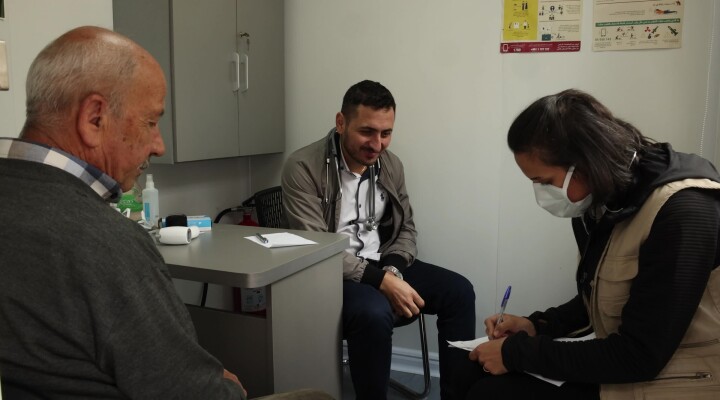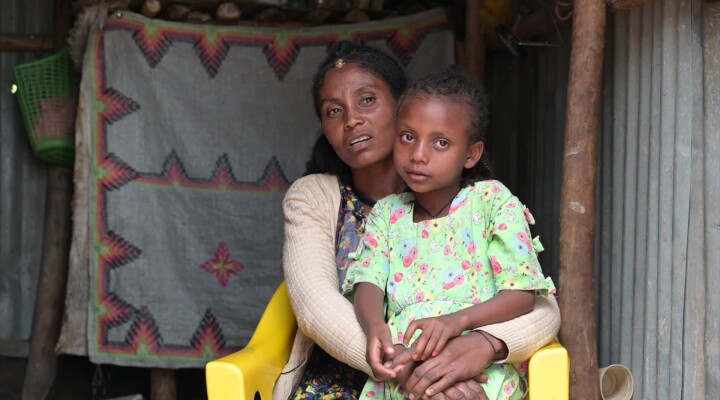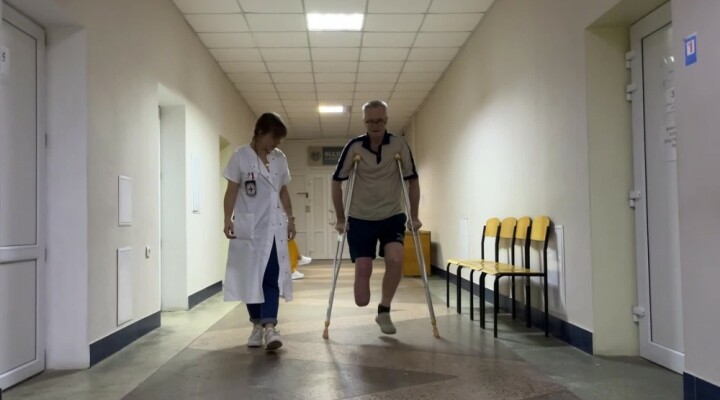Reducing TB in Ugandan jails
On the occasion of World Tuberculosis Day, 24 March, the International Committee of the Red Cross (ICRC) is calling attention to the fact that the contagious and potentially fatal disease is a major health problem in prisons. A project run by the organization in three jails in Uganda shows that tuberculosis can be fought successfully in detention facilities.
Run by the Ugandan authorities with the support of the ICRC, the project has resulted in increased cure rates for TB, a drop in the number of malaria cases, and HIV/AIDS mortality rates lower than among the general population.
"This is a revolution in provision of healthcare services in a prison setting" says Dr Johnson Byabashaija, Uganda's commissioner-general of prisons.
In prisons, the incidence of all three conditions is normally much higher – as are mortality rates – owing to overcrowding, unsanitary conditions and inadequate screening and treatment.
In 2012, the ICRC handed over the pilot projects to the Ugandan authorities, who would now like to take similar action in all prisons across the country. At the end of 2013 – a year and a half after the transfer of the project – the ICRC conducted an assessment to determine whether the projects were continuing to reduce TB, HIV and malaria rates among detainees.
The results were quite positive. In 2013, the number of inmates infected by TB diminished for the first time ever. The treatment success rate, which went from 63.1% in 2009 to 86.3% in 2012, also improved significantly in comparison with the national average.
In jails in Luzira, Fort Portal and Gulu, success rates for the treatment of tuberculosis exceeded targets set by the Ugandan health ministry (75%) and by the World Health Organization (85%).
The mortality rate remained relatively stable while the incidence of malaria dropped by 76% between 2009 and 2011.
In the pilot projects the prison services introduced new practices:
- quarantining and testing all new arrivals for TB, HIV/AIDS, malaria and other conditions;
- segregating those with TB and directly observing them taking their pills to ensure they complete the treatment and don’t develop multi-drug-resistant TB;
- improving TB patients' diet to boost their immune systems;
- offering voluntary HIV testing, follow-up care and peer-to-peer counselling;
- preventing the spread of malaria by regularly spraying wards and giving mosquito nets to female prisoners with children.
Prison laboratories were upgraded with better diagnostic and testing equipment and could operate around the clock owing to a regular electricity and water supply.
"What we have gone through in the past five years is a great transformation – from a rudimentary system to something that benefits inmates, staff and the neighbouring communities," says Alex Oloka, former officer in charge at Gulu prison.
The prison health centres also provide high-quality health care for the local population.
Specialist follow-up care in local clinics has also ensured that prisoners with TB and HIV continue their treatment after release, and has reduced the spread of disease to the wider community.
Godfrey was in Gulu prison for six months. He had TB and was diagnosed HIV-positive. Since leaving Gulu he has been collecting his medicine at a health centre near where he lives.
"In prison they told me that, after my release, my family should remind me to take my medication if I forget," he says.
Health-centre staff work with community-based treatment supporters who visit patients in their homes to check on whether they are taking their medicine and attending appointments.
According to Dr Abu Rabi, an ICRC specialist in health care in prisons, the authorities' political commitment and motivation contributed to the project's success, as did cooperation between the health, justice and interior ministries.
"We work with the prison authorities to identify gaps in areas such as health information systems, knowledge of the staff, testing and diagnosis in the laboratory or access to healthcare. It is not necessary that we always solve the issues but that we work together and motivate them to deliver results".
The ICRC has begun health-care pilot projects in prisons in nine other countries around the world. All will eventually be transferred to local control.
Shotlist
Location: Uganda and ICRC HQ (Geneva)
Length: 5'44
Format: MOV HD H264 (1920 x 1080)
Production: Vanessa Sharpe, Claire Doole
Camera: Edwin Thiongo
Sound: English, Swahili
ICRC ref: AV061N
Date: August 2013, March 2014
Copyright: ICRC access all
00:00 Shots of Fort Portal prison and detainees
00:14 Prisoners in Gulu
00:19 Unsanitary conditions in Lira prison (not in pilot project)
00:25 Quarantine of new arrivals at Gulu prison
00:35 Medical tests for new arrivals in Gulu
00:40 Segregation of people suspected of having TB in Gulu
00:50 Sick prisoners in Gulu
01:00 TB detainees receiving TB drugs and being directly observed
01:26 INTERVIEW: Monica Musubika, Clinical Officer Gulu Prison (English)
"The risk of not continuing with TB treatment is that you are at risk of death. You are at risk of developing multi-drug-resistant TB, which is a bit – very – expensive to manage in our country."
01:40 Sputum tests
01:51 Diagnosis and testing for TB, HIV and malaria at Gulu prison laboratory
02:25 HIV AIDS poster
02:28 Set-up shot: Andrew, detainee
02:31 INTERVIEW Andrew (English)
"When we are brought here, we are advised on HIV/AIDS. We could go for HIV counselling and testing, and the services here are provided freely."
02:43 Blood test for HIV voluntary testing
02:45 Confidential HIV counselling
02:57 Women's prison in Gulu
03:00 Meshed netting for malaria prevention
03:06 Women with children and mosquito nets
03:13 Town of Gulu
03:16 Godfrey riding to medical clinic
03:22 Godfrey at medical clinic
03:30 INTERVIEW Godfrey (Swahili)
"At Gulu central prison what I learnt was that when I leave, my family should remind me to take my medication if I forget."
03:44 Godfrey receiving drugs
03:51 Community at medical clinic
04:08 Local receiving treatment
04:16 INTERVIEW Alex Oloka, former officer in charge at Gulu prison (English)
"What we have gone through in the last five years is a great transformation from a system that is rudimentary to something much modern that has served for the benefit of the inmates, staff and neighbouring community who actually access services, because the quality of the services that they do get from the prisons is much better than even an outside health facility."
04:48 Prison officers in Gulu
04:56 Set-up shot of Dr Johnson Byabashaija, Uganda's commissioner-general of prisons
05:05 INTERVIEW Dr Johnson Byabashaija (English)
"I am passionate about all the ingredients of this project because this is a revolution in provision of health-care services in a prison setting."
05:17 INTERVIEW Dr Raed Abu Rabi, head of ICRC activities relating to detainee health care
"What we do is first of all we try to go with them to identify the gaps to see what needed to be done: it could be from the health information system, it could be the knowledge of the health staff, it could be related to the laboratory, it could be related to access to health care."
"We sit together to find the best way they can solve it with our help. And it is not necessary that we solve it, but we work together and we motivate them to deliver and it has a very good impact."
05:44 END



